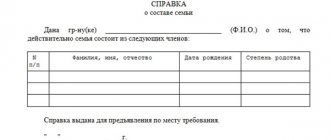Recognition as a family member in court (what evidence will the court take into account)
I am publishing this article as a continuation of the previously presented material on the main mistakes that can be made when applying to the court for recognition as a family member. The first part of the material describes the features of the proceedings in a special order, and provides recommendations as to who should be an applicant in this category of cases and who should be an interested party. And most importantly, errors are indicated in which the court may not consider the application, and if it does, then there may be no practical benefit from such a decision. You can read the first part of the article at the following link:
https://zakon.ru/blog/2021/1/18/priznanie_chlenom_semi_v_sudebnom_poryadke_glavnaya_oshibka
In the second part of the article, in turn, I will talk about the circumstances that the court takes into account when considering applications for recognition as a family member. I will tell you what circumstances are subject to proof, and with the help of what evidence they can be confirmed.
Before moving on to the evidence, I will indicate the main articles that are applied when considering this category of cases, and which, in fact, constitute the legal basis of the case.
By virtue of Art. 31 of the Housing Code of the Russian Federation, family members of the owner of a residential premises include his spouse living together with this owner in the residential premises belonging to him, as well as the children and parents of this owner. Other relatives, disabled dependents and, in exceptional cases, other citizens may be recognized as members of the owner’s family if they are settled by the owner as members of his family.
In other words, other close (for example, brothers and sisters) and distant relatives, and in exceptional cases (subject to a number of conditions specified below in the article) other citizens who are not related to the owner, but live together with him.
Valuable information that is taken into account by the courts when considering cases of recognition as family members is contained in paragraph 11 of the Resolution of the Plenum of the Supreme Court of the Russian Federation dated July 2, 2009 No. 14 “On some issues that arose in judicial practice when applying the Housing Code of the Russian Federation” by members of the owner’s family living premises may be recognized as other relatives regardless of the degree of relationship (for example, grandparents, brothers, sisters, uncles, aunts, nephews, nieces and others) and disabled dependents of both the owner himself and his family members, and in exceptional cases other citizens if they are moved in by the owner of the residential premises as members of his family.
To recognize the listed persons as members of the family of the owner of the residential premises, it is necessary not only to establish the legal fact of their move-in by the owner into the residential premises, but also to clarify the content of the owner’s will to move them in, namely: whether he moved the person to live in the residential premises as a member of his family or the premises were provided for residence on other grounds (for example, for free use, under a rental agreement). The content of the owner's will in the event of a dispute is determined by the court on the basis of explanations of the parties, third parties, testimony of witnesses, written documents (for example, an agreement on moving into a residential premises) and other evidence (Article 55 of the Code of Civil Procedure of the Russian Federation).
Thus, one of the main circumstances to be clarified is the will of the owner: in other words, with what intentions the owner moved persons into his home, recognition as family members in court is required.
The legislator’s logic is as follows: recognition by family members entails certain legal consequences. In particular, family members receive the right to live freely in the owner’s home. The court must make sure that the owner is aware of the legal consequences of recognizing persons living with him as family members.
In fact, for this category of disputes, all evidence is important to confirm that people living together are not just neighbors who, by chance, find themselves under the same roof, but a full-fledged family.
Let's talk about the signs that characterize relationships as family:
- moving into the apartment as family members;
- living together on a permanent basis (in this block you can describe how long the family has been living together; how many rooms are in the apartment/house, which room does each family member live in);
- good family and respectful relationships between family members;
- the presence of a general budget (it is worth describing how the family budget is formed. Which family members work and which do not);
- the presence of a common household/maintaining a common household (surprisingly, the court may even ask questions about whether family members shop and eat together or separately);
- distribution of responsibilities between family members (in this block you can describe who is responsible for the financial support of the family, who is responsible for raising children, preparing food, etc.).
Evidence may include:
- written and oral explanations from family members themselves;
- witness testimony (neighbors who know family members can be brought in as witnesses). The court may ask them questions about:
— how long have the witnesses known the family;
-how witnesses can characterize relationships within the family;
-What composition does the family live in?
I recommend that along with the application, you initially submit to the court a written statement from a witness in which he sets out the facts known to him and asks to be summoned to court to confirm these facts. In itself, such a written statement will not have the force of evidence for the court. It is attached so that the court in the future considers your request to call a witness justified and grants it.
- Receipts for joint purchases can be provided as proof of common household management.
- To confirm the fact of cohabitation, you can submit certificates from the school or other educational institutions where the children study, a certificate from the hospital stating that family members are attached to the clinic closest to their home, a certificate from the place of work if it is located in close proximity to the house . All this evidence will confirm that the family actually lives in the corresponding locality/district of the city.
To summarize, I note that the main thing that the court must verify is the fact of living together, joint housekeeping and the emergence of family relationships (based on mutual care and distribution of responsibilities) between family members.
In gratitude for the information provided, I ask you to subscribe to our YouTube channel, where a legal podcast is published every Sunday and a “question to a lawyer” section is published every Tuesday. Channel link: https://www.youtube.com/channel/UC05yJdlRTqBx0iPhX5S1esw?view_as=subscriber.
Or just type “Uzdiev and Partners” in a search on YouTube.
If you need advice, write to our email: [email protected]
Sincerely, Amy Maria Golmakova
Lawyer for legal work.
Who are the family members of the tenant of the premises?
In the case where housing is provided under a rental agreement, the status of a family member is acquired differently (Article 69 of the Housing Code of the Russian Federation). The circle of persons is the same, but due to the direct instructions of the law, such persons must be indicated in the social tenancy agreement. Move-in (does not belong to the first category) is possible not only with the consent of the landlord, but also of all other family members. This requirement does not apply to the placement of minor children with their parents.
Persons living together with the owner or tenant, in order to protect their rights in the event of various disputes, can file a claim in court for recognition as a family member.
Loss of status as a family member of the owner (tenant) of a residential premises: grounds and consequences
A family member of the owner of a residential premises loses the right to use in the following cases:
- sale of housing (transfer of ownership to another person)
- termination of family relationships. Only this case is a loss of status as a family member. This could be a divorce, annulment of a marriage, or the purchase of your own home.
When the status is lost, the right to use housing is not retained. As a general rule. The exceptions are:
- concluding an agreement with the owner about something else (including in an agreement on the division of property, etc.);
- the former family member has no grounds for acquiring or exercising the right to use other premises; their property status and other circumstances do not allow them to provide themselves with housing.
In the latter case, a former family member of the owner can file a claim in court to recognize the right to use the residential premises, and the owner can file a claim to recognize that he has lost the right to housing.
Former family members of the tenant, by virtue of the law, have the right to continue to use the residential premises if they do not move out of their own free will.
Rights and obligations of family members of the owner (tenant) of residential premises
What does the status of a family member give? They have the right to use housing. On a par with the owner (tenant) of residential premises. Well, use refers to actions that do not include the right to own housing (that is, rent it out, move in other persons (except minor children) without obtaining consent), dispose of it (sell, donate, assign, etc.).
If we are talking about family members of the owner of the residential premises, then such persons have the right to enter into an agreement with the owner, who will specify the procedure for use. For example, they may be given a specific room to live in. The amount of payment for utility services has been determined.
A family member of the owner or tenant may file a claim in court regarding the procedure for using residential premises in the event of disputes with the owner. They have the right to go to court with claims to remove obstacles to the use of property, regardless of the owner’s opinion.
Family members of the owner (tenant) of a residential premises have responsibilities - to use the residential premises for their intended purpose and to ensure the safety of the property. In addition, they bear joint and several liability (together with the owner) for obligations from the residential premises (payment of utility bills, compensation for damage due to flooding, etc.). Only those family members in respect of whom a decision has been made to declare them legally incompetent are exempt from liability.
Family members according to the Family Code
Family members in family law According to family law, spouses are recognized as family members, that is, persons between whom a marriage was concluded in the civil registry office. An ex-wife or ex-husband, as well as a common-law spouse, is not a family member. According to the Family Code, a child is recognized as a member of the family, regardless of his age (the Law “On the Status of Military Personnel” answers the question “are adult children members of the family” differently)
Brothers and sisters in family law are not family members, but are recognized as close relatives.
In the generally accepted concept, a first-degree relative is considered a family member. You probably know that in the Family Code of the Russian Federation there is also a mention of kinship lines, and this mention concerns specifically the issue of inheritance rights. This law determines that there are only 8 queues for inheritance. Moreover, each line has certain family ties. But, it is customary to include only husband and wife, their children, as well as their parents as a family.
How are family members defined?
Who is a family member under the law? How many days does it take for a claim to be considered by law? A claim, as a rule, is formed if the terms of the purchase and sale agreement are violated or if the terms of the contract for the provision of services have been violated. In fact, the legislative framework on this issue is considered to be quite extensive. But, if you study it in detail, then it is still possible to draw a single analogy. As for the housing code, everything is not as simple as it initially seems. And most likely, we can say that this document needs to be finalized, since it contains interpretations that allow anyone to be called a family member, even in the absence of family ties.
(read more…)
Who makes the laws? We immediately need to draw your attention to the fact that laws are created according to a very complex structure. All the features of creating a legislative framework in our country are clearly defined.
How to accept an inheritance legally? There is such a thing in our country as accepting an inheritance by law. In this case, we are talking about the fact that close relatives have the right to receive part of the inheritance.
Are they close relatives.....
This phrase often begins the questions that people ask lawyers when certain legal situations arise. Let's take a closer look at the different degrees of kinship to give a clear picture of who is a close relative, who is not, and when the question should be asked differently.
Husband and wife
From the point of view of at least half of the legislative acts, husband and wife are not close relatives to each other. Because there is no blood relationship between them. For them, the RF IC provides a special status - “family member” (Article No. 2). The Housing Code of the Russian Federation defines spouses (though not only them) in the same way.
The union of a man and a woman, officially confirmed by a marriage certificate, does not make them close relatives, but gives a number of privileges, at least equal to the privileges of close relatives.
For example:
- Spouses are included in the first priority of inheritance, along with their closest blood relatives
- Spouses have equal rights to close relatives in all legal spheres
- Spouses own common property in equal shares, regardless of which of them specifically acquired it. And they can divide it among themselves at any time
And, nevertheless, the concepts of “spouses” and “close relatives” are essentially opposite. After all, close relatives do not have the legal right to marry each other. So the correct answer to the question: “Are spouses close relatives?” should sound like this. “No, they are not, but that doesn’t matter, because in the eyes of the law, they have all the rights of close relatives.”
Former spouses
No. They were never close relatives, and after the divorce they lost their marital status, and with it all the privileges of a “family member.” Even if the spouses did not end their actual relationship after the divorce, or divorced, and then “changed their minds” and got back together, but did not register the marriage again, the former spouse does not have any rights.
Grandmother
Yes, grandmother is included in the list of close relatives in all legislative acts. With the exception of the Housing Code of the Russian Federation.
Grandfather
Like a grandmother, a grandfather is a close relative to his grandchildren.
Grandchildren
Accordingly, grandchildren are also close relatives of their grandparents. Moreover, even if the parents divorced, the grandson will not cease to be a close relative of his grandparents, both on the father’s side and on the maternal side. Whoever he ends up living with after the divorce.
Mother in law
The mother-in-law is not related to the daughter-in-law, the mother-in-law is not related to the son-in-law. Although for their children both of them will be a close relative - a grandmother. In relation to the spouses of their own children, parents are only relatives (brothers-in-law). The law includes stepmothers and stepfathers, stepsons and stepdaughters in the same category.
But if the latter are at least included in the last line of inheritance, then in relation to fathers-in-law and fathers-in-law, the law does not see any connection. With the exception of the Housing Code of the Russian Federation. The number of “family members” living in the same living space may include a mother-in-law or mother-in-law.
Brother or sister
Yes, these are close relatives, regardless of whether they both have the same parents or not
Cousin or brother
No, cousins are not considered close relatives from the point of view of the law. In fact, they are not even included in the inheritance queues. Cousins inherit from each other only by right of representation - instead of their parents who died before the testator.
Brother's wife or wife's brother
In everyday life, people can communicate closely with their spouses’ siblings, become friends, and even consider them “relatives.” But from the point of view of the law, this is only a remote property that is not mentioned in any legislative act. With the possible exception of the Housing Code of the Russian Federation, which is ready to recognize as a “family member” anyone living in the owner’s apartment.
If you still have questions related to the legislative interpretation of the concept of “close relatives,” you can seek advice from the lawyers of the Prav.io portal.
Marriage and family legislation
Family members: concept In the Tax Code there is the concept of interdependent persons. Based on the law’s interpretation of interdependence, the parties to the purchase and sale agreement lose tax advantages. Moreover, no other family members can be included in this social group. It should be noted that the relatives that make up it may or may not be blood relatives. But they must have a common household. They also financially support each other.
Dear readers! Our articles talk about typical ways to resolve legal issues, but each case is unique. If you want to find out how to solve your particular problem, please contact the online consultant form on the right or call: +7; 8It's fast and free!
Article 14 of the RF IC identifies the following citizens as close relatives:
Why is it important to know who is considered a family member from a legal point of view?
The status of relatives or family members gives people an expanded range of rights and responsibilities in relation to each other when resolving various legal issues. At the same time, family members may be provided with special preferences and opportunities, which must be taken into account in many aspects of life. That is why almost every person should know who is a family member. The most common situations in which you may need to know who is considered a family member and who is not include the following:
Is the right of residence of the former owner retained?
The Housing Code of the Russian Federation does not regulate the legal consequences of the absence of former family members of the owner of a residential premises in a residential premises due to leaving it.
According to the legal position of the Supreme Court of the Russian Federation, when a dispute arises, the actions of a former family member should be assessed according to the direction of his will.
If the actions of a former family member indicate his intention to change his place of permanent residence and leave the disputed apartment for a new place of permanent residence, then his right to use the privatized apartment is terminated due to his departure. This position is based on an analogy of the law: according to Article 83 of the Housing Code of the Russian Federation, a social tenancy agreement is terminated if the tenant and his family members move to another place of residence.
Thus, the right to use of a former family member of the owner of a privatized apartment is terminated due to his departure from the apartment to another permanent place of residence, despite the equal rights with the owner during the privatization of the apartment.
At the same time, the voluntary departure of the former owner from the privatized apartment to another place of residence indicates the refusal of the former member of the owner’s family from his right to use the privatized apartment.
Leaving a privatized apartment for another place of residence is the citizen’s exercise of his right to freedom of movement, established by Art. 7 of the Law of the Russian Federation of June 25, 1993 N 5242-1 “On the right of citizens of the Russian Federation to freedom of movement, choice of place of stay and residence within the Russian Federation.”
The relocation of citizens to the Russian Federation to a new place of residence is formalized upon his application by the registration authority in accordance with clause 31 of the Rules for registration and deregistration of citizens of the Russian Federation at the place of stay and at the place of residence within the Russian Federation and the list of officials responsible for registration,” approved by Decree of the Government of the Russian Federation of July 17, 1995 N 713, removal of a citizen of the Russian Federation.







